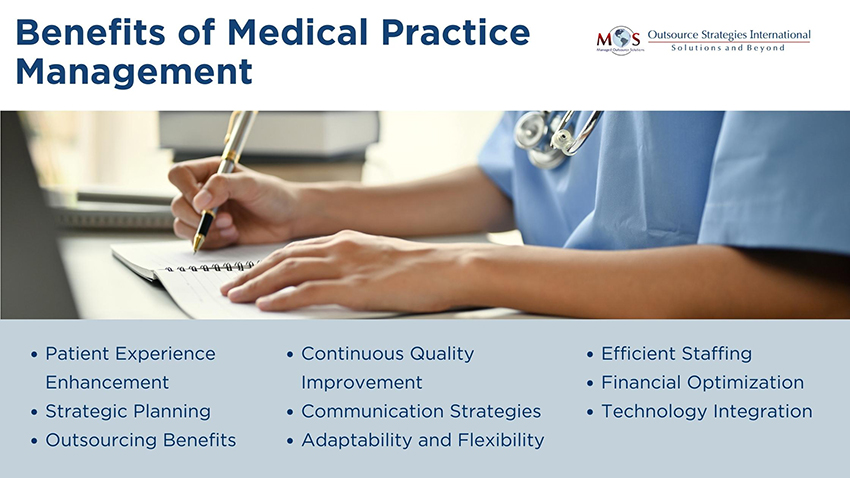A successful medical practice has strong foundations in business and non-clinical functions. If you are struggling to manage your billing, appointment scheduling, human resources, and other administrative functions, revamping your practice management could be the answer. With efficient practice management strategies, such as medical billing outsourcing, you can focus on patient care and medical decision-making. There are many other areas where strong practice management can have a positive impact on your medical practice’s overall success.

Optimize your practice’s financial health with cutting-edge medical billing services.
Medical Practice Management – What You Need to Know
- What is Medical Practice Management?
Medical practice management is a critical aspect of ensuring the smooth operation of your healthcare practice. It includes the management of financial matters, human resources, information technology, compliance, marketing, and operational functions.
- Robust Practice Management is Essential
Physician burnout is a rising concern, often resulting from factors such as an increasing workload, insufficient support, a stressful work environment, and the pressure of meeting patient needs and demands. As non-clinical burdens continue to rise, medical practices need effective strategies to manage these challenges.
The adoption of electronic health records (EHRs) and other health information technology systems has become increasingly complex. Practice management helps you stay abreast of technology trends, invest in suitable software and hardware, and ensure data security and interoperability.
The healthcare industry’s ever-growing number of regulations and compliance requirements present another formidable challenge justifying the need for practice management. In addition to EHR mandates, you need to dedicate time and resources to comply with insurance regulations, billing and coding changes, and HIPAA regulations.
Navigating the intricate world of medical billing and reimbursement is another substantial challenge. To receive payment for services rendered, you must ensure accurate coding, timely claims submission, and diligent follow-up on denials.
The operational efficiency of your practice also hinges on adept handling of time-consuming administrative tasks such as scheduling, staffing, payroll, and inventory management. Budgeting, tax compliance, accounting, and financial planning are increasingly demanding for medical practices. Additionally, addressing the risk of malpractice lawsuits and other legal matters involves meticulous documentation and potential litigation.
Meeting the rising expectations of patients regarding the quality of care, convenience, and communication further adds to the challenges faced by a medical practice. Efficient medical practice management plays a pivotal role in helping you strike a balance between the demands of patient care, administrative tasks, and your personal life.
Given these challenges, most practices are outsourcing their practice management or a part of it to professionals. For example, outsourced medical coding and billing services can improve claim accuracy, streamline paperwork, increase staff productivity, enhance patient satisfaction and improve overall practice efficiency.
- What Medical Practice Management Covers
Medical practice management (covers the administrative and operational activities necessary for the efficient functioning of your medical practice. The key aspects that medical practice management includes are:
Administrative Services
This includes appointment scheduling, patient registration, collecting and maintaining patient demographics and insurance verification and authorization, and handling medical billing, coding, and claims processing for accurate reimbursement. The administrative aspects of practice management include managing patient records, ensuring compliance with privacy regulations, and facilitating the secure exchange of health information.
Financial Management
Medical practice management involves overseeing the revenue cycle, the entire patient encounter process from scheduling and registration to the final payment of a balance. Financial reports are generated and analyzed, and budgets and financial plans are developed to guide the practice’s financial decisions.
Human Resources Management
The quality of care delivered depends significantly on the competence and proficiency of your staff. Organizing the staff to align with a practice’s needs, size, and culture is a crucial responsibility of medical practice management. This impacts the daily operations of the practice and also influences patient satisfaction.
As per the Medical Group Management Association (MGMA), practices experience suboptimal efficiency and financial performance when they are either understaffed or overstaffed. Lack of adequate staff hampers productivity, forcing employees and the physician into tasks outside their expertise, creating inefficiencies. This can result in issues with patient access and diminished staff morale. Conversely, excess staff increases overhead and causes confusion about task responsibilities.
Staff should be provided with ongoing training and professional development opportunities. Human resource management also entails maintaining a positive work environment.
HIPAA Compliance
Ensuring compliance with the Health Insurance Portability and Accountability Act is essential to protect patient privacy. Throughout various phases of medical billing, adherence to HIPAA requirements is essential to safeguard the privacy of individually identifiable health information and ensure the confidentiality, integrity, and availability of electronic protected health information (ePHI).
- Practice Management Software versus Medical Billing Software
Practice management software streamlines various tasks in running a practice, including appointment scheduling, patient information tracking, and invoice management. It enhances efficiency, reducing errors and time spent on billing. Improved administrative efficiency and reduced wait times contribute to an enhanced patient experience, fostering greater satisfaction and retention. The software seamlessly integrates with other healthcare systems, such as EHRs, medical billing platforms, and patient engagement tools, further optimizing medical office operations.
If you’re a healthcare provider looking to manage only the financial aspects of your practice, consider using medical billing software tailored to your requirements. This software offers a range of functions, from simple statement generation to automating billing processes and managing the revenue cycle, encompassing billing, coding, and submitting claims to insurance companies. The software can provides you and your medical billing team immediate access to any bill or claim. For example, billing staff can track when a specific bill was sent to a patient, check its payment status, and assess how long it has been overdue.
Outsource Billing and Boost Reimbursement
Outsourcing certain staff functions in a practice to outside contractors could solve problems like high staff turnover, tight budgets, and inefficient use of staff, according to Lara Hochman, MD, a practice management consultant in Austin, Texas (Source: www.medscape.com). For instance, partnering with an expert in areas like billing and collections can ensure more efficient and faster reimbursements. It’s worth noting that leading medical billing outsourcing companies can work with various types of billing software.






